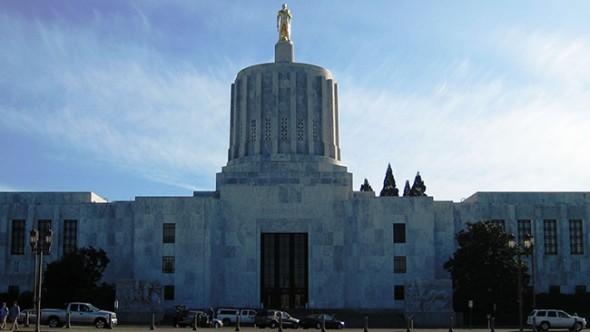CUB, Other Stakeholders Present Arguments at HB 2866 Hearing
Posted on March 15, 2019 by Samuel Pastrick
Tags, Telecommunications

On Tuesday, March 12, the Oregon House Judiciary Committee held an initial public hearing on HB 2866, a bill from CUB, ACLU of Oregon, and OSPIRG. HB 2866, or the Data Transparency and Privacy Protection Act (DATPA), will empower Oregonians with greater data transparency from businesses operating in Oregon and improved protections for their personal information.
For substantial background on HB 2866 policy, readers should review CUB’s blog introduction as well as our presentation of the bill from the hearing on the 12th. A quick summary of the proposed legislation is that Oregonians have a fundamental “Right to Know” what happens with their personal information derived from their activities on their various digital electronic devices (phone, tablet, computer, etc.). Right to Know is the data transparency cornerstone to any digital privacy policy or set of policies.
Additionally, HB 2866 requires business entities operating in Oregon that collect, analyze, derive, sell, lease, or otherwise transfer geolocation or audiovisual information from Oregonians’ digital electronic devices, to first disclose their intent and methodology, and receive express consent from Oregonians.
During the hearing, well-funded and out-of-state lobbying groups made the same well-worn arguments they have for years. The industry players that benefit most from the monetization of personal information, including the Internet Association (whose members include Amazon, Facebook, Google, and more), the State Privacy and Security Coalition (internet service provider trade association), and TechNet (Verizon, AT&T, Comcast, and others), predictably stoked fears that any oversight of their business would harm innovation and security, and diminish customer experience.
Fortunately, both the facts and support from key legislators and ally groups are on DATPA’s side. The first panel of the day included Representative Carla Piluso (D) of Gresham and Senator Sara Gelser (D), whose district encompasses the greater Corvallis and Albany areas.
Representative Piluso focused her testimony on the increasingly alarming connection between domestic violence and access to geolocation information, through the sharing of such data with brokers who then sell it and other sensitive personal information to the highest bidder, even bounty hunters.
Senator Gelser, on the other hand, discussed her personal experience with microphone enabled listening devices like Amazon’s personal assistant, “Alexa.” Evidently, the Senator’s Alexa recorded her family’s personal conversations without any prompting. Senator Gelser was understandably distressed, particularly concerning recordings of her children.
The next panel included a presentation from myself on behalf of CUB, and testimony from Electronic Frontier Foundation Legislative Counsel, Ernesto Falcon, and OSPIRG State Director, Charlie Fisher. The last panel of the day featured additional supportive testimony from ACLU of Oregon Policy Director, Kimberly McCollough, Oregon Department of Justice Deputy Legislative Director, Cheryl Hiemstra, and former Oregon House Speaker and House Majority Leader, Dave Hunt.
The crux of the argument expressed on these two panels is that in the 21st century, our daily lives require frequent digital engagement – to do our jobs, discover and apply for new employment, participate both socially and civically, and receive a multitude of services. HB 2866 is a good faith effort to begin a necessary and timely policy conversation around data transparency and privacy protection.
HB 2866 already reflects several months of policy development and input from digital privacy experts including Electronic Frontier Foundation and the Digital Privacy Alliance. As for next steps: CUB, ACLU, and OSPIRG – as well as House Majority Leader (and House Judiciary Committee Chair), Jennifer Williamson, and certain industry players – are interested in forming a workgroup to fine-tune the legislation. Continued inaction on Oregonians’ data transparency and privacy protection is not an option, so any workgroup must be limited in both time and scope.
Representative Janelle Bynum (D), whose district includes North Clackamas, Happy Valley, and parts of East Portland and Gresham, provided one of the hearing’s most memorable highlights when she expressed her dismay with industry arguments and emphasized the need for speed. Oregonians hand over their personal information day after day, often without their knowledge or opportunity to provide consent. This is a growing problem and one the Oregon legislature can and should address in 2019. You can support HB 2866 today by signing onto CUB’s testimony.
To keep up with CUB, like us on Facebook and follow us on Twitter!




09/05/22 | 0 Comments | CUB, Other Stakeholders Present Arguments at HB 2866 Hearing